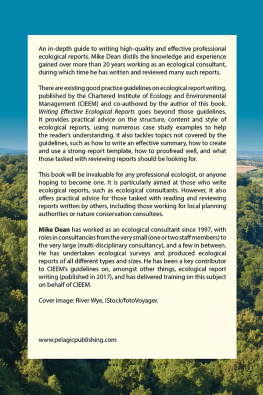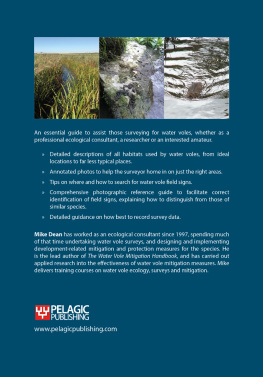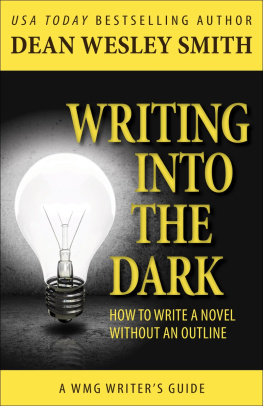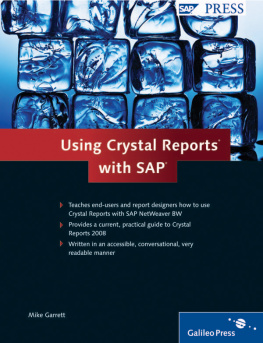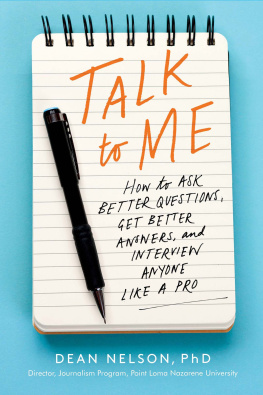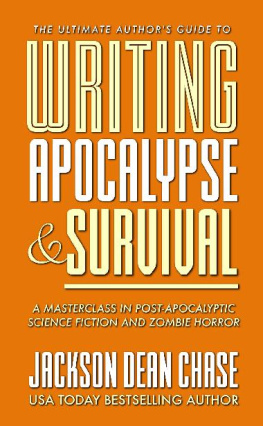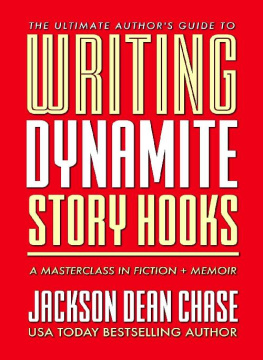Writing Effective Ecological Reports
Writing Effective Ecological Reports
A Guide to Principles and Practice
Mike Dean
Pelagic Publishing | www.pelagicpublishing.com
Published by Pelagic Publishing
PO Box 874
Exeter
EX3 9BR
UK
www.pelagicpublishing.com
Writing Effective Ecological Reports: A Guide to Principles and Practice
ISBN 978-1-78427-241-8 (Pbk)
ISBN 978-1-78427-242-5 (ePub)
ISBN 978-1-78427-243-2 (ePDF)
Copyright 2021 Mike Dean
The moral rights of the author have been asserted.
All rights reserved. Apart from short excerpts for use in research or for reviews, no part of this document may be printed or reproduced, stored in a retrieval system, or transmitted in any form or by any means, electronic, mechanical, photocopying, recording, now known or hereafter invented or otherwise without prior permission from the publisher.
A CIP record for this book is available from the British Library
Cover image: River Wye, iStock/fotoVoyager.
Contents
When Mike Dean asked if I would write the foreword to this book, of course I said yes. I wanted to add my enthusiastic endorsement for such valuable new guidance for the ecological profession. However, when I agreed, I thought it would be an easy task. After all, I have been working in ecology and the planning system for over thirty years. I have read and reviewed hundreds of ecological reports and written my fair share too. So, how difficult could it be to pen a short foreword? But as I sit here to write the first words, Ive been struck by just how important and timely Writing Effective Ecological Reportsreally is.
All this has taken me by surprise, and my task is a little more daunting than I first imagined. This book deserves the ecological equivalent of a trumpet fanfare. Perhaps a 90-decibel recording of a rampant, roaring bull elephant sent out as an mp3 file to every practising ecologist. It really is that sort of book; it warrants such a proclamation.
Mike has produced a book that should be essential reading for anyone involved in writing or reviewing ecological reports. It should be on everyones reference shelf. In fact, this book is probably relevant to every single ecologist, as I cant think of one professional role where, at some point, you wouldnt need to know how to write a report effectively.
When I read Mikes draft a few months ago, I had both an emotional and instinctive response. First, was envy! Why hadnt I thought of this brilliant idea, as it fills such an obvious gap in the market? That said, it is hard to be envious of someone who I respect and hold in such high esteem. While Mike is the consummate professional, and capable of pin-point clarity over what is right or wrong with a report, he is also extremely humble. And dont take my word for it, just read the opening of that runs throughout the book. He sets out to offer clear insight into what makes for an effective ecological report from the position of someone who has learned the lessons the hard way.
Setting aside my fleeting feelings of envy, I now come to the deeper instinctive reaction I had when I started to understand what Mike is trying to achieve here. Simply put, he wants us all to be able to write really effective ecological reports. But think about it, that is incredibly ambitious! From my own perspective, gathered over three decades of working in and with local planning authorities all around the UK, Id say a large proportion of ecological reports fall far short of being fully effective. But why does the need for effective ecological reports stir me at some primal level? I would have to say its partly to do with self-preservation, along with a burning desire to ensure my great-grandchildren (no, I dont have any yet) are also able to enjoy a future filled with nature in all the diversity I have enjoyed during my life.
Its clear to me that, as ecologists, we need to know how we can communicate, to the very best of our abilities, about the perils facing the natural environment and the means by which, as a society, we can mitigate that damage. And lets be under no illusions, us ecologists have a huge responsibility to help halt the decline of biodiversity. We need to do that here in the UK and anywhere else we may work around the globe. This is one of the main reasons I get out of bed in the morning (although, as I get older, getting to the bathroom is normally the first!). By the way, Mike says hes not keen on authors putting text inside brackets!
At the time of writing this foreword, the year 2020 has been extraordinary for many reasons.

